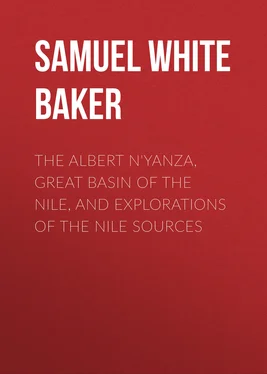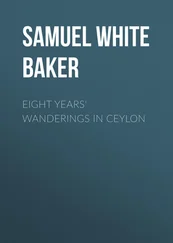Samuel White Baker - The Albert N'Yanza, Great Basin of the Nile, And Explorations of the Nile Sources
Здесь есть возможность читать онлайн «Samuel White Baker - The Albert N'Yanza, Great Basin of the Nile, And Explorations of the Nile Sources» — ознакомительный отрывок электронной книги совершенно бесплатно, а после прочтения отрывка купить полную версию. В некоторых случаях можно слушать аудио, скачать через торрент в формате fb2 и присутствует краткое содержание. Издательство: Иностранный паблик, Жанр: Путешествия и география, История, foreign_edu, foreign_antique, foreign_prose, на английском языке. Описание произведения, (предисловие) а так же отзывы посетителей доступны на портале библиотеки ЛибКат.
- Название:The Albert N'Yanza, Great Basin of the Nile, And Explorations of the Nile Sources
- Автор:
- Издательство:Иностранный паблик
- Жанр:
- Год:неизвестен
- ISBN:нет данных
- Рейтинг книги:4 / 5. Голосов: 1
-
Избранное:Добавить в избранное
- Отзывы:
-
Ваша оценка:
- 80
- 1
- 2
- 3
- 4
- 5
The Albert N'Yanza, Great Basin of the Nile, And Explorations of the Nile Sources: краткое содержание, описание и аннотация
Предлагаем к чтению аннотацию, описание, краткое содержание или предисловие (зависит от того, что написал сам автор книги «The Albert N'Yanza, Great Basin of the Nile, And Explorations of the Nile Sources»). Если вы не нашли необходимую информацию о книге — напишите в комментариях, мы постараемся отыскать её.
The Albert N'Yanza, Great Basin of the Nile, And Explorations of the Nile Sources — читать онлайн ознакомительный отрывок
Ниже представлен текст книги, разбитый по страницам. Система сохранения места последней прочитанной страницы, позволяет с удобством читать онлайн бесплатно книгу «The Albert N'Yanza, Great Basin of the Nile, And Explorations of the Nile Sources», без необходимости каждый раз заново искать на чём Вы остановились. Поставьте закладку, и сможете в любой момент перейти на страницу, на которой закончили чтение.
Интервал:
Закладка:
My men evinced a sullen demeanour, neglected all orders, and I plainly perceived a settled discontent upon their general expression. The donkeys and camels were allowed to stray, and were daily missing, and recovered with difficulty; the luggage was overrun with white ants instead of being attended to every morning; the men absented themselves without leave, and were constantly in the camps of the different traders. I was fully prepared for some difficulty, but I trusted that when once on the march I should be able to get them under discipline. Among my people were two blacks: one, "Richarn," already described as having been brought up by the Austrian Mission at Khartoum; the other, a boy of twelve years old, "Saat." As these were the only really faithful members of the expedition, it is my duty to describe them. Richarn was an habitual drunkard, but he had his good points; he was honest, and much attached to both master and mistress. He had been with me for some months, and was a fair sportsman, and being of an entirely different race to the Arabs, he kept himself apart from them, and fraternised with the boy Saat.
Saat was a boy that would do no evil; he was honest to a superlative degree, and a great exception to the natives of this wretched country. He was a native of "Fertit," and was minding his father's goats, when a child of about six years old, at the time of his capture by the Baggera Arabs. He described vividly how men on camels suddenly appeared while he was in the wilderness with his flock, and how he was forcibly seized and thrust into a large gum sack, and slung upon the back of a camel. Upon screaming for help, the sack was opened, and an Arab threatened him with a knife should he make the slightest noise. Thus quieted, he was carried hundreds of miles through Kordofan to Dongola on the Nile, at which place he was sold to slave-dealers, and taken to Cairo to be sold to the Egyptian government as a drummer-boy. Being too young he was rejected, and while in the dealer's hands he heard from another slave, of the Austrian Mission at Cairo, that would protect him could he only reach their asylum. With extraordinary energy for a child of six years old, he escaped from his master, and made his way to the Mission, where he was well received, and to a certain extent disciplined and taught as much of the Christian religion as he could understand. In company with a branch establishment of the Mission, he was subsequently located at Khartoum, and from thence was sent up the White Nile to a Mission-station in the Shillook country. The climate of the White Nile destroyed thirteen missionaries in the short space of six months, and the boy Saat returned with the remnant of the party to Khartoum, and was re-admitted into the Mission. The establishment was at that time swarming with little black boys from the various White Nile tribes, who repaid the kindness of the missionaries by stealing everything they could lay their hands upon. At length the utter worthlessness of the boys, their moral obtuseness, and the apparent impossibility of improving them, determined the chief of the Mission to purge his establishment from such imps, and they were accordingly turned out. Poor little Saat, the one grain of gold amidst the mire, shared the same fate.
It was about a week before our departure from Khartoum that Mrs. Baker and I were at tea in the middle of the court-yard, when a miserable boy about twelve years old came uninvited to her side, and knelt down in the dust at her feet. There was something so irresistibly supplicating in the attitude of the child, that the first impulse was to give him something from the table. This was declined, and he merely begged to be allowed to live with us, and to be our boy. He said that he had been turned out of the Mission, merely because the Bari boys of the establishment were thieves, and thus he suffered for their sins. I could not believe it possible that the child had been actually turned out into the streets, and believing that the fault must lay in the boy, I told him I would inquire. In the meantime he was given in charge of the cook.
It happened that, on the following day, I was so much occupied that I forgot to inquire at the Mission; and once more the cool hour of evening arrived when, after the intense heat of the day, we sat at table in the open court-yard; it was refreshed by being plentifully watered. Hardly were we seated, when again the boy appeared, kneeling in the dust, with his head lowered at my wife's feet, and imploring to be allowed to follow us. It was in vain that I explained that we had a boy, and did not require another; that the journey was long and difficult, and that he might perhaps die. The boy feared nothing, and craved simply that he might belong to us. He had no place of shelter, no food; had been stolen from his parents, and was a helpless outcast.
The next morning, accompanied by Mrs. Baker, I went to the Mission and heard that the boy had borne an excellent character, and that it must have been BY MISTAKE that he had been turned out with the others. This being conclusive, Saat was immediately adopted. Mrs. Baker was shortly at work making him some useful clothes, and in an incredibly short time a great change was effected. As he came from the hands of the cook—after a liberal use of soap and water, and attired in trowsers, blouse, and belt—the new boy appeared in a new character.
From that time he considered himself as belonging absolutely to his mistress. He was taught by her to sew; Richarn instructed him in the mysteries of waiting at table, and washing plates, &c.; while I taught him to shoot, and gave him a light double-barrelled gun. This was his greatest pride.
In the evening, when the day's work was done, Saat was allowed to sit near his mistress; and he was at times amused and instructed by stories of Europe and Europeans, and anecdotes from the Bible adapted to his understanding, combined with the first principles of Christianity. He was very ignorant, notwithstanding his advantages in the Mission, but he possessed the first grand rudiments of all religion—honesty of purpose. Although a child of only twelve years old, he was so perfectly trustworthy that, at the period of our arrival at Gondokoro, he was more to be depended upon than my vakeel, and nothing could occur among my mutinous escort without the boy's knowledge: thus he reported the intended mutiny of the people when there was no other means of discovering it, and without Saat I should have had no information of their plots.
Not only was the boy trustworthy, but he had an extraordinary amount of moral in addition to physical courage. If any complaint were made, and Saat was called as a witness—far from the shyness too often evinced when the accuser is brought face to face with the accused—such was Saat's proudest moment; and, no matter who the man might be, the boy would challenge him, regardless of all consequences. We were very fond of this boy; he was thoroughly good; and in that land of iniquity, thousands of miles away from all except what was evil, there was a comfort in having some one innocent and faithful, in whom to trust.
We were to start upon the following Monday. Mahommed had paid me a visit, assuring me of his devotion, and begging me to have my baggage in marching order, as he would send me fifty porters on the Monday, and we would move off in company. At the very moment that he thus professed, he was coolly deceiving me. He had arranged to start without me on the Saturday, while he was proposing to march together on the Monday. This I did not know at the time.
One morning I had returned to the tent after having, as usual, inspected the transport animals, when I observed Mrs. Baker looking extraordinarily pale, and immediately upon my arrival she gave orders for the presence of the vakeel (headman). There was something in her manner, so different to her usual calm, that I was utterly bewildered when I heard her question the vakeel, "Whether the men were willing to march?" Perfectly ready, was the reply. "Then order them to strike the tent, and load the animals; we start this moment." The man appeared confused, but not more so than I. Something was evidently on foot, but what I could not conjecture. The vakeel wavered, and to my astonishment I heard the accusation made against him, that, "during the night, the whole of the escort had mutinously conspired to desert me, with my arms and ammunition that were in their hands, and to fire simultaneously at me should I attempt to disarm them." At first this charge was indignantly denied until the boy Saat manfully stepped forward, and declared that the conspiracy was entered into by the whole of the escort, and that both he and Richarn, knowing that mutiny was intended, had listened purposely to the conversation during the night; at daybreak the boy reported the fact to his mistress. Mutiny, robbery, and murder were thus deliberately determined.
Читать дальшеИнтервал:
Закладка:
Похожие книги на «The Albert N'Yanza, Great Basin of the Nile, And Explorations of the Nile Sources»
Представляем Вашему вниманию похожие книги на «The Albert N'Yanza, Great Basin of the Nile, And Explorations of the Nile Sources» списком для выбора. Мы отобрали схожую по названию и смыслу литературу в надежде предоставить читателям больше вариантов отыскать новые, интересные, ещё непрочитанные произведения.
Обсуждение, отзывы о книге «The Albert N'Yanza, Great Basin of the Nile, And Explorations of the Nile Sources» и просто собственные мнения читателей. Оставьте ваши комментарии, напишите, что Вы думаете о произведении, его смысле или главных героях. Укажите что конкретно понравилось, а что нет, и почему Вы так считаете.












